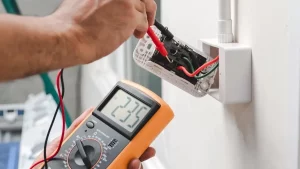Electrical inspections play an essential role in maintaining safety and compliance within residential properties. These assessments help uncover hidden dangers, such as faulty wiring and overloaded circuits. Homeowners may overlook these issues, unaware of their potential risks. Regular inspections not only safeguard families but also guarantee adherence to national and local codes. Understanding the nuances of these inspections can greatly impact property value and security in any community. What critical factors should homeowners consider when scheduling an inspection?
Key Takeaways
- Regular electrical inspections identify hazards early, preventing potential electrical fires and ensuring a safe living environment.
- Compliance with national and local codes guarantees that homes are up to safety standards, protecting residents from electrical risks.
- Inspections help reduce energy costs and extend the lifespan of appliances, contributing to overall household efficiency.
- Signs like flickering lights or warm outlets indicate the need for inspections to address potential issues before they escalate.
- Choosing qualified professionals for inspections ensures thorough assessments, reinforcing safety and community standards.
Understanding the Risks of Electrical Issues in Homes
Electrical issues in homes pose significant risks that can jeopardize both safety and property. Faulty wiring, overloaded circuits, and outdated electrical panels can lead to catastrophic events such as electrical fires or electrocution. Moreover, the presence of moisture in electrical systems can exacerbate these dangers, creating hazardous conditions that may go unnoticed by untrained eyes. Inadequate grounding and improper installation of fixtures also contribute to the potential for severe accidents. Additionally, malfunctioning appliances can create unexpected surges, leading to damage not only to the devices but also to the home’s electrical infrastructure. Understanding these risks underscores the critical need for regular assessments, as the importance of electrical inspections in homes cannot be overstated in maintaining a secure living environment.
Key Benefits of Regular Electrical Inspections
While many homeowners may overlook the necessity of routine assessments, the key benefits of regular electrical inspections are essential for ensuring safety and compliance. These inspections serve as a proactive measure to identify potential hazards, such as frayed wiring or overloaded circuits, before they escalate into serious issues. By ensuring that electrical systems operate efficiently, homeowners can reduce energy costs and prolong the lifespan of appliances. Additionally, regular inspections enhance property value, as prospective buyers appreciate the assurance of a safe electrical system. Ultimately, the importance of electrical inspections in homes cannot be overstated; they provide peace of mind, safeguard family well-being, and foster a secure living environment that aligns with community standards and expectations.
How Electrical Inspections Ensure Compliance With Safety Standards
Ensuring compliance with safety standards is essential for maintaining the integrity of a home’s electrical system, as inspections provide an opportunity to evaluate adherence to current codes and regulations. Qualified inspectors meticulously assess wiring, outlets, and circuit breakers to identify potential hazards that could jeopardize safety. These inspections are conducted in accordance with national and local electrical codes, ensuring that homes meet established safety benchmarks. Additionally, inspectors can pinpoint outdated or faulty components, recommending necessary updates to enhance safety and efficiency. By fostering compliance, electrical inspections in homes not only protect residents from electrical hazards but also contribute to a sense of security and assurance within the community, reinforcing the importance of safeguarding one’s living environment.
Signs That Indicate the Need for an Electrical Inspection
Recognizing the signs that indicate the need for an electrical inspection is essential for maintaining a safe and efficient home environment. Homeowners should be vigilant for frequent circuit breaker trips, which may suggest overloaded circuits or faulty wiring. Additionally, the presence of flickering lights can indicate loose connections or overloaded circuits. Unusual burning odors or scorch marks around outlets signal potential fire hazards, necessitating immediate inspection. Moreover, if outlets or switches feel warm to the touch, this could be a sign of dangerous electrical issues. Finally, homes over 20 years old should undergo regular inspections due to aging wiring. Addressing these signs promptly underscores the importance of electrical inspections in homes, ensuring safety and compliance.
Choosing the Right Professional for Electrical Inspections
How can homeowners confidently select a qualified professional for electrical inspections? First, they should verify the technician’s credentials, ensuring they possess appropriate licenses and certifications specific to electrical work. Homeowners should prioritize professionals with extensive experience in residential inspections, as this knowledge is essential for identifying potential hazards. Seeking referrals from trusted sources or reading online reviews can also aid in the selection process, as personal recommendations often reflect reliability and quality of service. In addition, obtaining multiple quotes allows homeowners to compare services and pricing transparently. Ultimately, choosing the right professional for electrical inspections not only guarantees a thorough assessment but also reinforces the importance of electrical inspections in homes, ensuring safety and compliance with local regulations.
Frequently Asked Questions
How Often Should Electrical Inspections Be Performed in Homes?
Electrical inspections should be performed every three to five years for most homes. However, older properties or those undergoing renovations may require more frequent assessments to guarantee compliance with safety standards and proper functionality.
What Is the Average Cost of a Home Electrical Inspection?
The average cost of a home electrical inspection typically ranges from $100 to $300, depending on the property’s size and complexity. Homeowners should consider this investment essential for maintaining safety and compliance with electrical standards.
Can Homeowners Perform Their Own Electrical Inspections?
Homeowners can conduct basic visual inspections, but professional evaluations are recommended due to complex electrical systems. Expertise guarantees safety and compliance, making professional electrical inspections essential for maintaining a secure and compliant home environment.
What Qualifications Should an Inspector Have for Electrical Inspections?
An inspector should possess relevant certifications, such as a licensed electrician qualification, extensive knowledge of electrical codes, and experience in evaluating residential systems. This expertise guarantees thorough evaluations and promotes safety and compliance within home environments.
Are Electrical Inspections Required for Home Insurance Policies?
Electrical inspections may be required by some home insurance policies to guarantee safety and compliance. Insurers often mandate these inspections to mitigate risks, thereby enhancing coverage and potentially lowering premium costs for homeowners.
Conclusion
To sum up, prioritizing electrical inspections is essential for safeguarding homes against potential hazards while ensuring compliance with safety standards. Regular evaluations not only identify and mitigate risks such as faulty wiring and overloaded circuits but also enhance property value and foster a secure living environment. Homeowners are encouraged to remain vigilant and proactive in scheduling these inspections, thereby protecting their families and adhering to community regulations, ultimately contributing to a safer residential landscape.
You May Also Like To Read:



